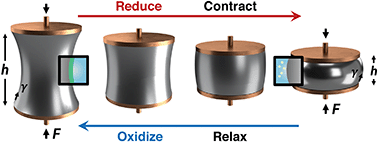Soft actuators by electrochemical oxidation of liquid metal surfaces†
Abstract
The surface energy of liquid metals can be electrochemically controlled over a wide range of values – from near zero to 500 mJ m−2 – using a low voltage potential (∼1 V). This enables the ability to create soft-matter actuators that exhibit a high work density on small scales. We demonstrate that a liquid metal (LM) meniscus wetted between two copper pads can function as an electrochemical soft actuator whose force and shape are controllable by tuning the LM surface energy. Energy minimization models are presented in order to predict the actuator performance as a function of LM droplet and Cu pad dimensions. The results suggest that the electrochemical LM actuator has a unique combination of high work density, biologically-relevant activation frequency, and low operational voltage that stands out from other classes of soft-matter actuators.



 Please wait while we load your content...
Please wait while we load your content...